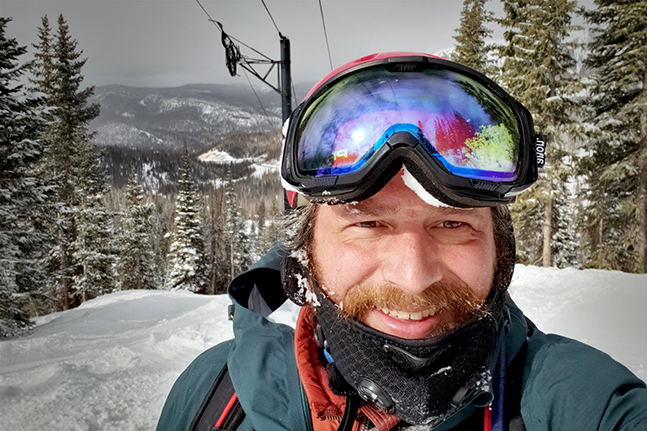Ira Allen lay face down in the snow, his left lung filling with blood, unable to move anything below his upper chest. He kept trying to call out for help, but his voice was too soft to carry.
“I remember thinking, ‘Well, I had a pretty good run.’ Not that specific ski run: my life more generally.”
Allen, arriving from Beirut, Lebanon, moved to Flagstaff for the outdoor scene. Not only did his in-laws reside here, but the mountain town provided endless opportunities to explore. When two faculty positions opened at Northern Arizona University, he and his wife, Laura Noll, jumped at the chance. They packed up their life in the Middle East and moved halfway around the world.
At the time of his snowboarding accident, Allen, an associate professor of rhetoric in NAU’s Department of English, had been skiing and snowboarding for more than 30 years. He grew up riding the Ice Coast and lived for the thrill of big drops in the Pacific Northwest, deep powder glades, long side-piste ridges, canyons, tight trees and back bowls. The situation on Snowbowl that day was nothing special—nothing he hadn’t seen before.
“The usual Arizona melt-freeze cycle had laid in a pretty thick layer of ice under the groom in places, and I just wasn’t emotionally attuned enough for the combination of conditions and speed,” Allen recalled. The accident caused retrograde amnesia and left him trying to piece together what happened that day. “From reconstructing the scene and my injuries later, I must have tagged a tree branch and gotten flipped hard and fast onto my chest. I remember trying to put down an edge and it just not taking for maybe 15 yards. I was simultaneously paralyzed and in excruciating, devastating pain.”
After a gurney-sled ride down the mountain with Snowbowl’s Ski Patrol, Allen was transported to Flagstaff Medical Center (FMC), then helicoptered to Banner Hospital in Phoenix.
There, he underwent surgery to fuse the crushed vertebrae in his spine. After his lung collapsed due to complications, he spent the next week on a ventilator, fighting for his life.
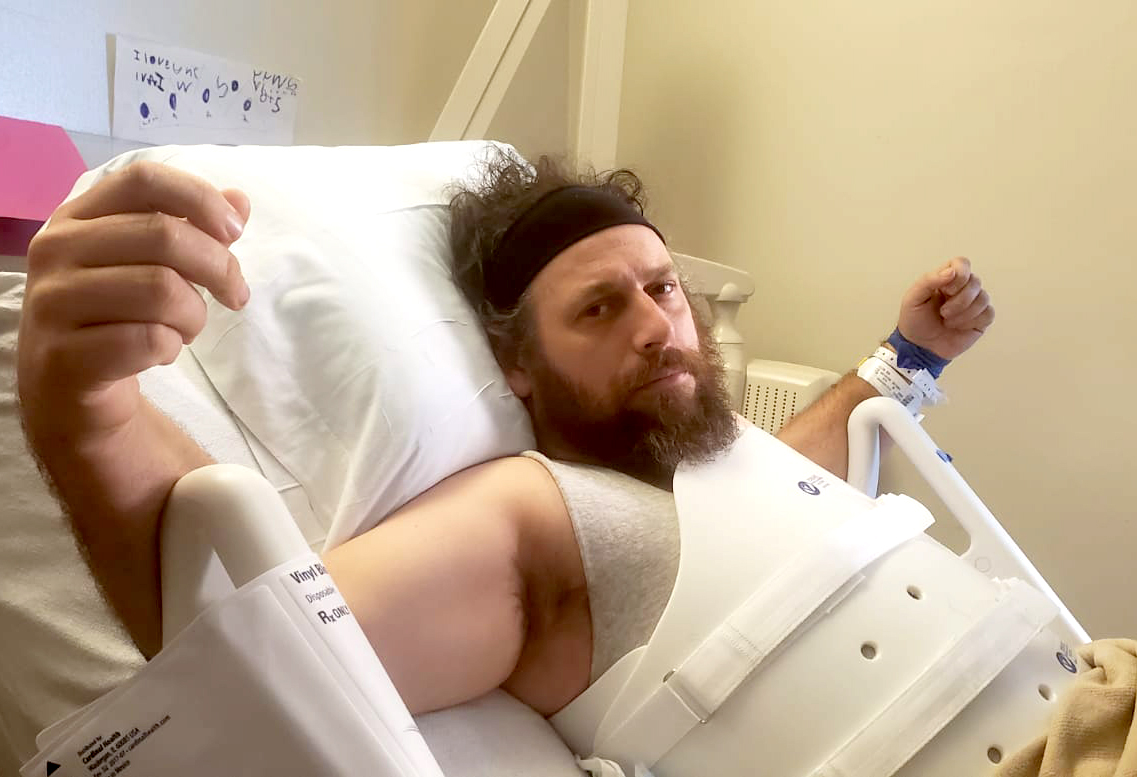
“It was a rough start to 2020, which was a tough year for everyone, obviously. I’m lucky, in a sense, that I got injured when I did,” Allen said. In the early stages of the pandemic, before COVID-19 made its way to the U.S., people were still traveling freely, which meant his family and friends could be there to support him in his recovery. Allen’s mother spent weeks by his hospital bed and with him through his transfer to Barrow Hospital for neuro rehab. “NAU friends came down to visit me in the hospital, my colleagues did a meal train when I got back. Everyone wasn’t blasted with collective trauma like they—we all are—now, and there was a lot of kindness from a great many people, so many people across different parts of my life. I was unbelievably fortunate in this. The recovery itself sucked, of course. It was a lot of work, a lot of effort and pain and frustration.”
While relearning how to walk, Allen remembers yelling, screaming at his legs to work. And again, he was fortunate—his legs did (eventually) work again.
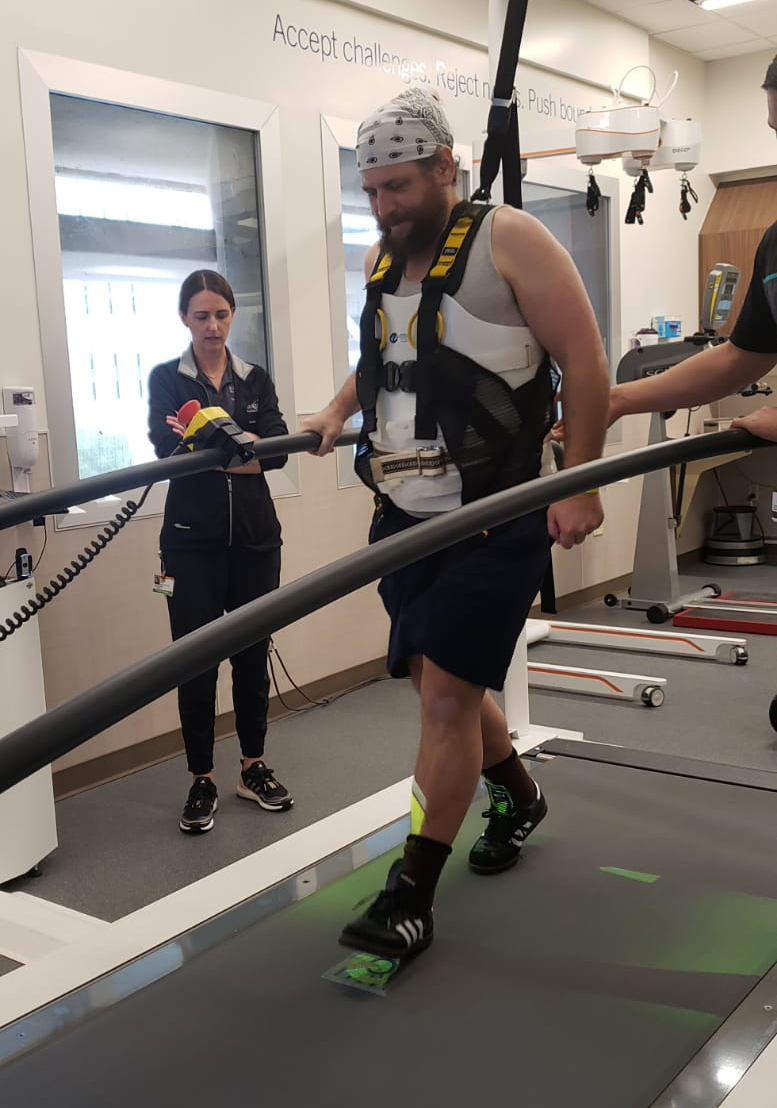
“He was super knowledgeable, kept researching more to figure out how to help me push to the next level. Between him and my other PTs, and just the wonderful village of people who were showing up across my life to help me, I was able to get back out hiking (slow and ugly and unsteady) by summer of that year.”
Though he still had a long way to go in his recovery, by December 2020, one year after the accident, Allen was ready to get back on his snowboard.
“I felt raw terror the first time I got on a lift again, but I was able to sit and be present with the fear, let that be OK and ride out one shaky run that first day back out.”
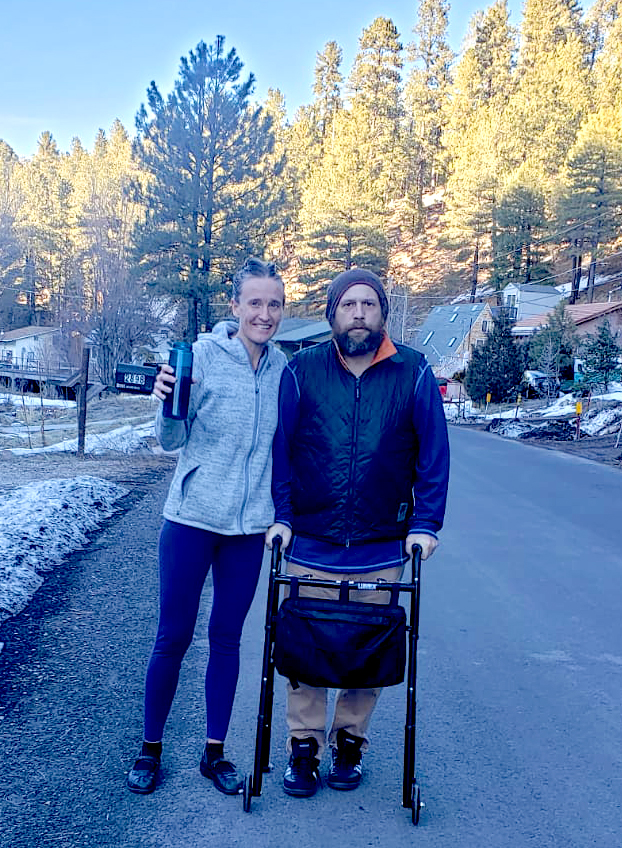
With the support of his wife, Noll, a clinical psychologist and neuroscientist in NAU’s Department of Psychological Sciences, Allen was able to get over the physical and emotional hurdles of recovery. Noll, an ultramarathoner, began training him in trail running, which provided another outlet for Allen to push himself.
Two years after the accident, Allen is still in a lot of pain—some days, it’s worse than others. He suffers from significant numbness, which makes going downstairs difficult, let alone his outdoor activities.
“The spinal surgeon said, when he did the fusion, that most people recover about as much as they’re going to by the 18-month mark, so for a long time I was able to direct a lot of mental and emotional and physical energy to seeing how much feeling and movement I could recover. For a while, that was great. I was disabled, yeah, but I was able to imagine it might be temporary. If I worked hard enough, took direction, kept pushing, maybe I’d be able to get it all back. And I got a LOT back! But not all. Not even close to all.”
After the 20-month mark and with no significant changes in his recovery, depression set in. The grim realization that he would struggle going to the bathroom and getting dressed for likely the rest of his life left Allen in a weird place. On one hand, he had survived a spinal accident that should have killed him. On the other, he was still disabled. He realized how ungrateful he was becoming, and in fall 2021, tried to shift his frame of mind.
“I stopped working on ‘recovery’ and started working on ‘capacity.’ Like, OK, I have a permanent disability. It’s harder for me to do simple things, and I feel a fair bit of pain, and I have to be careful about stuff. Fine, good, OK. But what can I DO?! That’s the question I’m asking these days, which is what helps me push through trail running, snowboarding, cross-country split board travel, etc.”
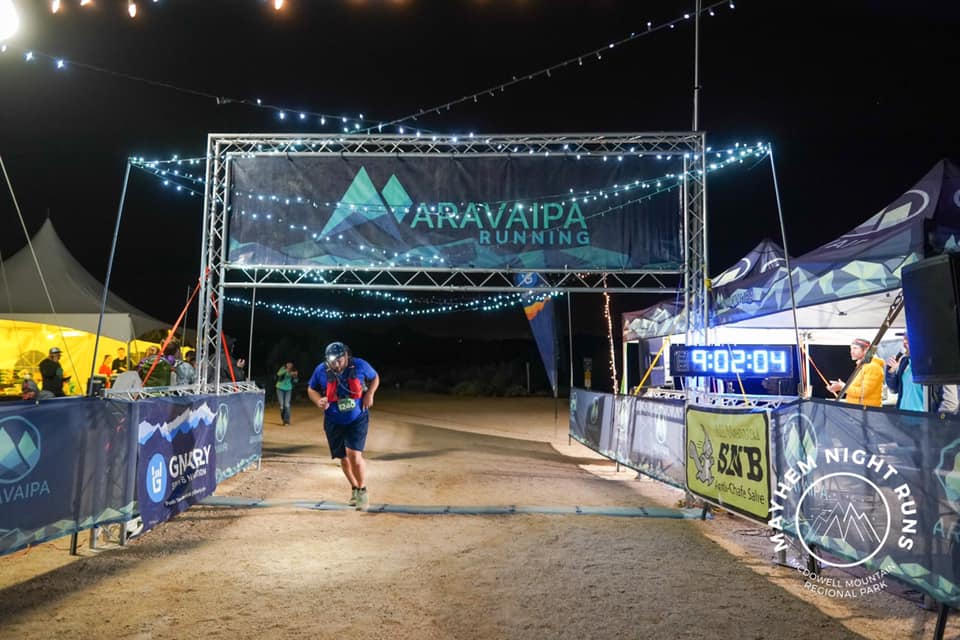
Allen did a 10-mile night race on trails down near Phoenix a few weeks ago and is signed up for a big one in Moab next month: a race of 33 kilometers (approximately 20 miles) and a 4,000+ ft elevation gain. He isn’t racing against anyone else; just himself.
Shifting his disability mindset has also affected Allen’s teaching. He’s always been compassionate; he experienced a lot of adversity before becoming a professor. Each semester, he shares with students his story of struggling through college with a 0.9 GPA, an F+, his first year. But now, he finds himself sympathizing with his students on a deeper level, knowing everyone has struggles that you don’t and can’t see.
“I try to help my students who have more difficulties with stuff that’s technically their own responsibility, not mine, by reaching out a little extra. You know, sending one more email to check in when people miss a few assignments, that kind of thing. We’ve all got a lot of pain of one sort or another—especially these days—so it’s important to have especially soft edges when doing so might help someone else be more capable.”
Allen has come a long way since that near-death experience on the mountain, and though his life will never be the same, he’s endured too much pain and frustration and come too far in his recovery to give up hope now.
“It’s always our job to work through our own struggles, and there’s a lot we can only do in solidarity, working together, but I do think it’s an important truth that at any moment more really might be possible.”
Carly Banks | NAU Communications
(928) 523-5582 | carly.banks@nau.edu
